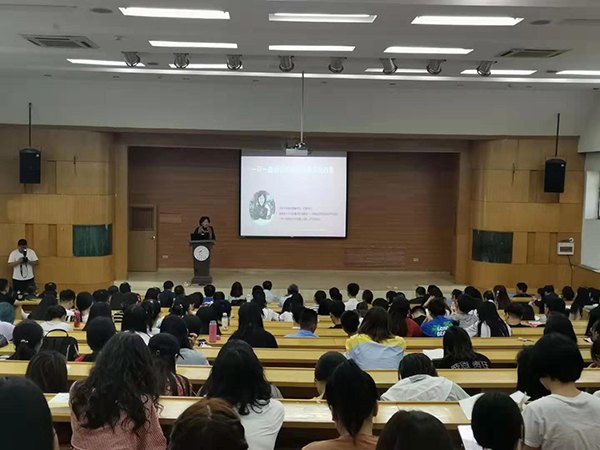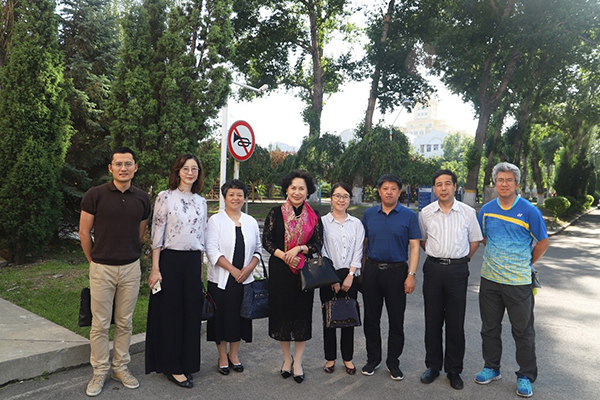On the afternoon of June 19, Prof. Tao Yitao, as an outstanding alumna of Heilongiang University (HLJU), gave an academic report titled the “Institutional and Cultural Constraints for the Implementation of the Belt and Road Initiative” at the invitation of HLJU for teachers and students from the School of Economics and Business Administration on “Sunshine Forum”. Prof. Tao Yitao is Director of the China Center for Special Economic Zone Research (CCSEZR), Shenzhen University (SZU), President of the Belt and Road Research Institute of SZU and also President of the Belt and Road Research Institute (Shenzhen) for International Cooperation and Development (BRRIICD). The lecture, hosted by Chang Shuchun, who is Dean of the School of Economics and Business Administration in HLJU, was attended by about 300 teachers and students.

Scene of the lecture
Prof. Tao conducted an in-depth analysis of the institutional and cultural constraints from the three aspects of “The Proposition of the Belt and Road Initiative and World Economic Landscape”, “Implementation Effectiveness of the Belt and Road Initiative” and “The Significance and Value of Inclusive Development”.
Prof. Tao pointed out that the implementation of the “Belt and Road Initiative” is basically not a simple economic issue for China or countries along the route, but rather a non-economic issue where cultural and institutional constraints weigh more heavily on the BRI than the capital and technology barrier. Compared with capital and technology barrier, the institutional and cultural constraints are seemingly the softest, but actually the hardest and therefore the most fundamental ones. She believed that overcoming the institutional and cultural constraints and establishing an inclusive and operable institutional-cultural cognition co-system are policies and intelligent considerations that prelude the effective implementation of the "Belt and Road Initiative", both logically and practically. Prof. Tao analyzed the three institutional-cultural constraints confronting the BRI in a profound manner by drawing on the lesson learned from the failure of Myitsone Dam Project: First, lack of knowledge about the BRI is the biggest problem plaguing the BRI implementation. Second, the biggest obstacle to the BRI implementation stems from our own cognitive abilities rather than from outside. Third, the most crucial step in pushing the BRI lies in changing how we think and act.

Prof. Tao gives an academic report
Prof. Tao stressed that the establishment of mutual trust is the most urgent mission for the BRI implementation. The mutual trust between countries can be achieved through cultural inclusiveness and identity. The cultural identity, however, does not indicate two cultures simply become similar or one negates the other, but means a win-win outcome through mutual respect. Only in such background can the common rules recognized and followed by the members of a regional community turn into resources and fortunes.
She also underlined that BRI is not just a Chinese opportunity created by China for the world, but also a world opportunity created by China for itself. The most fundamental prerequisite for its successful implementation depends more on the mutual inclusiveness and respect between different cultures than simply the capital and technology. And such inclusiveness and respect stand for a general knowledge about and reverence of human civilization.
The teachers and students enthusiastically responded to and thought highly of the lecture by Prof. Tao. At the end of the lecture, Dean Chang concluded: This is a rare and high-caliber lecture from a great scholar, which broadens our horizons and opens up our minds. And it will promote the research of China-Mongolia-Russia Economic Corridor (CMREC) in the framework of "Belt and Road Initiative” in HLJU from the perspective of theory and empirical studies. He expected future support from Prof. Tao in developing the Theoretical Economics of HLJU.

Prof. Tao is taking photo with leaders and some of the professors form the School of Economics HLJU.


